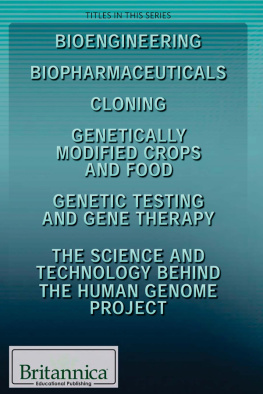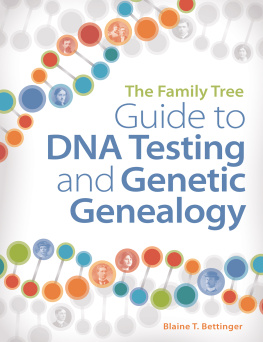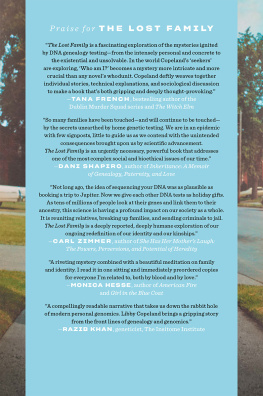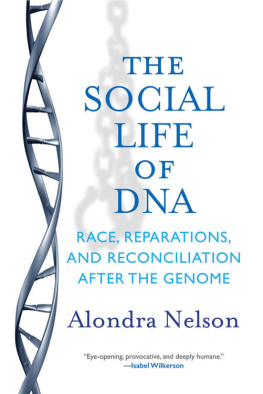Praise for The Social Life of DNA
Alondra Nelson tells a story for anyone interested in their own family, even their own memory. Using fresh genetics research and writing like an investigative reporter, Nelson clears up the mystery about our societys rush to DNA.
Edward Ball, author of Slaves in the Family
Alondra Nelsons account of how genetic data was transformed into contested political culture is as lucid as it is path-breaking. This exhilarating survey of how DNA became an agent in the politics of reparation and reconciliation has not only extended analysis of race and racism but created a new field of comparative research.
Paul Gilroy, professor of American and English literature, Kings College, London
The Social Life of DNA is remarkable. Alondra Nelson explains the ways in which genomic research is being deployed by people, particularly black Americans, to explore their genealogical roots. She also examines the meaning of this activity: the motivations behind it, the communities it creates, the conflicts it engenders, the enterprises it supports, the changes in self-definition it encourages. Nelson explores this large, sprawling, fascinating subject with clarity, passion, rigor, and a keen eye for revealing detail. The Social Life of DNA will appeal to a broad readership interested in history, race, and science. Geneticists, sociologists, anthropologists, political scientists, and jurists will be stimulated by reading this book. It is a brilliant work.
Randall Kennedy, Michael R. Klein Professor at Harvard Law School and author of The Persistence of the Color Line
Alondra Nelson takes us into a complex and endlessly fascinating space where genetic ancestry testing meets racial politics. With her unique and wonderful gifts for research and insight into genetic science, ethnography, and history, The Social Life of DNA comes at a moment when the questions it raises about race and social justice couldnt be more pressing and urgent.
Rebecca Skloot, author of The Immortal Life of Henrietta Lacks
The double helix now lies at the center of some of the most significant issues of our time, Alondra Nelson writes in this valuable and illuminating book. Since 2003, she has been following the ways that DNA intertwines with race, and The Social Life of DNA is her cleareyed, sharp, and closely observed account of the phenomenon. It couldnt be more timely.
Jonathan Weiner, Maxwell M. Geffen Professor of Medical and Scientific Journalism at Columbia Journalism School
One of this generations most gifted scholars examines the unfolding mysteries of DNA sequencing and the limits and promises of genetic genealogy at the intersection of race, politics, and identity. Alondra Nelson brilliantly guides us on a journey of discovery in this cautionary tale of the high-stakes efforts to reconcile our racial origins and to find redemption as a country. Eye-opening, provocative, and deeply humane.
Isabel Wilkerson, author of The Warmth of Other Suns
The Social Life of DNA is a brilliant ethnography of the recreational uses of DNA. Besieged as our culture has become by beguiling promises of romantic heraldry and forensic infallibility, Nelson takes an unflinching yet sympathetic look at how popular yearning for lost roots has led to DNA as metaphor: reading our genes has become an inferential, often scientifically unsubstantiated link between past, present, and future. It has emerged as the symbolic grounding for magical cures, heritage tourism, and escapist fantasy, as well as legal actions for ethnic and racial reconciliation, reparations, and repatriation. Timely and original, this book offers a nuanced and engrossing negotiation between genetic truth and truthiness.
Patricia J. Williams, James L. Dohr Professor of Law at Columbia University and columnist for The Nation
THE SOCIAL LIFE OF DNA
RACE, REPARATIONS, AND RECONCILIATION AFTER THE GENOME
Alondra Nelson
BEACON PRESS
BOSTON
To my parents, Robert Samuel Nelson and Delores Yvonne Nelson, who gave me roots and wings
CONTENTS
PREFACE
Like many Americans, my family and I were riveted by the Roots miniseries when it first aired in January 1977. I vividly recall sitting in front of the television with my mother, father, sister, and two brothers watching the story of Alex Haleys family unfold in Technicolor.
My father, having just completed a tour at sea, reclined in an armchair, his feet up. My mother was on the sofa with one or two of us kids twined tightly around her. The other two of us were on the floor, alternately being admonished by our parents not to lie too close to the screen or told, courtesy of a sibling, to move out of the way. On Sunday evening, when it became apparent that we would view the first episode in its entiretywell past our bedtimeswe knew we were in uncharted territory.
The Roots occasion provided one of those unforgettable moments when a child sees her parents in a new light. Watching Roots, I also watched my parents, who were visibly stirred by Haleys account. More than a few times during those eight evenings, my mothers eyes welled with tears. She frequently shook her head and murmured Uhm-uhm-uhm, as I had heard Mary, her Philadelphia-born mother, do many times. An inherited response for emotions that defy language, perhaps. My father, who hailed from New Orleans, was characteristically stoic, but occasionally allowed a Thats a damn shame during an especially graphic or tragic scene. I realize now that while watching Roots, my parents similarly watched us, their children. They were worried and protective, interspersing their own commentary between scenes, hoping to ameliorate the dramatic effect of this painful history.
The Roots effect expanded beyond our family home, perched on the edge of a craggy San Diego canyon, to my grade school, nestled in a valley. I was called Kizzy and Kunta Kinte by my mostly blond classmates during first period at my Southern California private school. But during our lunch breaks, the teasing gave way to earnest but clumsy conversations. In the schoolyard, we tried to make sense of what Roots meant for our interracial friendships, for our discussions in Sister Noras American history class, and for our nation in the wake of its bicentennial. In our own ways, we each wondered, Who are we in relation to this history? Did this really happen? If so, how did we get from then to nowand where do we go from here?
Haley made his mark as a collaborator on The Autobiography of Malcolm X, the late activists influential account of his political transformation published in 1965. This work emerged at the beginning of the black power era. Roots, published in 1976, and the television miniseries that was based on it, which premiered a year later, were culminating symbols of the era. This was the time of the Afro and the dashikiof the Black is beautiful ethos. Between 1965 and 1977, black Americans turned to their African origins with intensity.
This interest in African origins and, in turn, genealogy was piqued in 1977. This watershed year also saw the publication of Black Genealogy by Charles L. Blockson, a primer of root-seeking attuned to the needs of African Americans, who faced especially steep hurdles in tracing ancestry. The Afro-American Historical and Genealogical Society (AAHGS), the first national black organization dedicated to genealogy and family history, was also established in 1977. In the intervening decades, genealogy only grew in appeal for African Americans. In the last decade, with the decoding of the human genome, new tools were introduced that expanded the popularity of genealogy exponentially and, moreover, gave it multifaceted uses.
Next page






